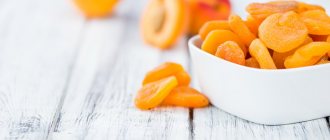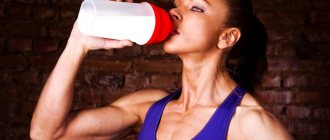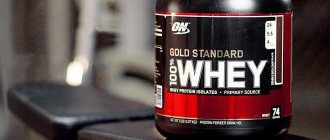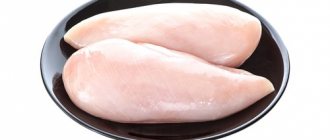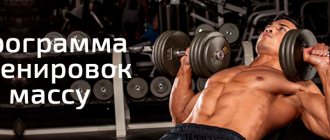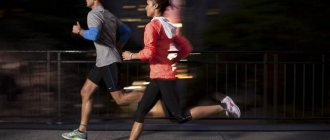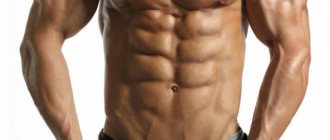In order to achieve results in sports, you need motivation, perseverance and endurance. You will have to train a lot, take care of your health and physical condition. Health in this matter is very important, since if the immune system is weakened or there is a problem with certain organs and systems, the body may not be able to cope with the stress, and one will have to give up on one’s sporting goals. A healthy diet is very important for athletes to keep them in good shape and help them reach their goals.
Features of proper nutrition for athletes
Proper nutrition for an athlete will depend on what kind of sport we are talking about. It is important that the body receives a sufficient amount of vitamins and minerals . You also need to take into account that sports activities lead to large losses of energy by the body, so you need to monitor both the caloric content of your diet and ensure that the food is healthy. The following requirements apply to the nutrition of a person who is actively involved in sports:
- The amount of calories should be sufficient.
- The body must receive sufficient vitamins and microelements.
- Additionally, it is recommended to use dietary supplements that activate metabolism.
- The diet should be planned depending on what your goal is - to reduce or increase body weight.
- The menu should be designed so that it helps reduce fat mass and build muscle.
Also, when planning meals for athletes, remember about water.
Lack of fluid leads to muscle fatigue and spasms. And during active training, the body loses a lot of water, so it is important to replenish my reserves. The basis of any diet is three elements: proteins, carbohydrates and fats . Each of them influences the athlete’s diet in one way or another.
Carbohydrates
Carbohydrates are a group of compounds of organic origin, found in the cells of all living organisms and necessary for normal existence. They are, in fact, the main supplier of energy in the body.
Carbohydrates are divided into two types - simple and complex. Complex carbohydrates are polysaccharides: fiber, starch, and so on. The body breaks them down slowly, so blood sugar levels change slowly, without sudden jumps.
Sources of complex carbohydrates are beans, beans, peas, lentils, cereals, durum wheat pasta. This also includes fruits, vegetables, berries, and mushrooms.
Simple carbohydrates are mono- and disaccharides, such as fructose, glucose, sucrose and so on. Unlike complex carbohydrates, these carbohydrates dissolve more easily in water and, accordingly, are quickly absorbed by the body. Eating simple carbohydrates before a workout can make you feel tired quickly. They are useful after training because they help to restore strength well.
Sources of simple carbohydrates are flour products, sugar, sweets, honey, bananas, dried fruits, potatoes, pumpkin, rice, corn sticks and so on.
As for carbohydrates, when planning your healthy diet for an athlete, consider the following point. Before training you need to eat complex carbohydrates, after - you can eat simple ones. The amount of carbohydrates per day should be 5-9 grams per kilogram of your weight. And the emphasis should be on complex carbohydrates. The best time to use them is the first half of the day. In the process of preparing for competitions, which in professional circles is known as “cutting,” the amount of carbohydrates should be reduced to 2.5 grams per kg of body weight.
Squirrels
A proper diet for an athlete should include proteins . These are organic substances consisting of amino acids that are connected in series. They include proteins and peptides. Proteins are extremely important for all tissues in the body, they are necessary for the digestive and immune systems.
Depending on the type of activity, the amount of protein needed per day may vary. The average diet for an athlete recommends consuming 1.4 g of protein per kg of body weight .
Sources of protein are chicken, beef, turkey, fish (especially trout, tuna, pink salmon), seafood (caviar, shrimp), eggs, white beans, and dairy products. Proteins are also found in rice, oatmeal, and rolled oats. Proteins are very important for athletes, since they are the main building material for muscles.
Fats
The next component that is included in the rational nutrition of athletes is fats . They are natural organic compounds that have two main functions - organic and structural. Normally, it is advisable to consume 0.4-0.6 g of fat per kilogram of body weight per day.
Fats are saturated and unsaturated. Saturated fats are made up of molecules full of hydrogen. At normal temperatures they do not become softer. Therefore, they are considered harmful because they contribute to the formation of cholesterol plaques in blood vessels. Once in the body, these substances slow down metabolism, thereby complicating the process of losing weight and leading to excess weight.
Products with saturated fats are margarine, butter, coconut oil, animal fat, chicken skin and so on. Also these are fatty sauces, pastry creams, fast food.
The molecules in unsaturated fats are not entirely filled with hydrogen. Their main sources are plant products. At normal temperatures, these fats can become liquid, so the body quickly processes them, and there is no harm to health .
There is an opinion that fats in the diet should be limited. In fact, the body needs them, but only the right ones and in moderation. Their lack can disrupt hormonal levels, worsen the formation of muscle tissue, and reduce the functioning of the immune system. Unsaturated fats are also needed to help the body absorb vitamins better. It is worth choosing them, and their quantity in the diet should not exceed 20% of its total calorie content.
Healthy fats are found in olive, soybean, corn oil, nuts and nut butters, caraway oil, fish, and seafood.
How to eat properly as an athlete
For a person who exercises regularly it is necessary:
- eat at least 4 times a day;
- think over snacks (protein or carbohydrate);
- Make sure that your food contains sufficient amounts of protein, fiber and carbohydrates.
Depending on gender, weight, and intensity of training, calorie intake will be from 2000 to 4000 calories per day. In rare cases, you can increase the calorie content to 6000 - 7000 calories. Bodybuilders, powerlifters, boxers, swimmers and runners require a lot of energy. But still, do not confuse professional sports with amateur ones.
When distributing meals, you need to make sure that they are optimally combined with training time. Eating immediately before classes is prohibited - discomfort or digestive upset may occur. It is recommended to eat 1.5-2 hours before training. Then the body will have time to absorb all the necessary substances and tune in to the workout.
How to eat on training day
It is worth planning about +800 kcl in addition to the basic diet, this will be enough to replenish the energy spent during the workout. If your goal is to gain weight, then you will have to “eat up” 1200 or even more.
Important! It is recommended to eat 1.5-2 hours before training. Digesting food also requires energy. Therefore, immediately after eating, your body may not be able to cope with two tasks at the same time.
Before training, you can eat a protein-carbohydrate bar or a banana.
Proper nutrition for athletes
It is worth understanding that the nutritional characteristics of athletes and bodybuilders will differ from the characteristics of the usual diet, because these people have a serious load, and regularly, so you need to take into account the following aspects when planning the menu:
- The diet must be of high quality and complete. You need to lean on those foods that are healthy and productive for the body.
- Amount of food consumed. Everything will depend on the specific type of activity. Some people need to eat a lot to gain weight, others need to eat little to lose it. You need to consider your goals when planning a balanced diet for athletes.
- Number of meals. It is better to eat in small portions, but often enough. This will help not to overload the body before physical activity, maintain the body in one energy rhythm and avoid the feeling of heaviness. In addition, this way the food will be processed better and absorbed faster.
Prohibited foods
People who are actively involved in training should not only eat right, but also permanently avoid eating foods such as:
- Chips. In the process of preparing this product, substances are used that provoke the development of cancer cells. And people who regularly consume this product suffer from high cholesterol, which causes heart attacks.
- Soda. This drink contains a large amount of sugar. Regular consumption of such drinks leads to diabetes and obesity.
- Fast food. Snacks on the go and “fast food” are prohibited for athletes. Proper and balanced nutrition will ensure maximum effectiveness from your workouts.
- Sweets. Regular consumption of sweets causes weight gain.
- Fried food is harmful.
- Margarine. Forbidden! This is the most harmful fat; you should also exclude all products in which it was used.
- Mayonnaise. Everyone loves dressing salads with mayonnaise. But, as you know, this is very harmful. Excess weight, high cholesterol, all this occurs due to regular intake of mayonnaise.
- Smoked meats contain carcinogens.
- Alcohol. Many articles and lectures have been read on this topic. Therefore, there is no need to explain the harm of alcoholic beverages; everyone understands this perfectly well.
Diet options for athletes depending on the regime and load
As is already clear, proper nutrition for athletes will depend on the training regimen, type of activity and level of load. A simple diet option for approximately 2600 kcal could be something like this:
- Breakfast. A couple of boiled eggs, about 200 grams of low-fat cottage cheese, a plate of oatmeal with milk with a little olive oil, a couple of pieces of bran bread, tea.
- Lunch. A couple of fruits, a bun, a glass of natural low-fat yoghurt.
- Dinner. Buckwheat with milk, an omelet from a couple of chicken eggs, about 200 grams of vegetable salad, 3 slices of whole grain bread, about 50 grams of low-fat cheese, tea.
- Afternoon snack. 150 grams of low-fat cottage cheese, half a plate of any porridge with fruits or berries, a glass of juice.
- Dinner. 250 grams of fresh fruits or vegetables, a couple of slices of bran bread, a glass of kefir.
- An hour before bedtime, you can eat an apple and drink a glass of milk/kefir.
And this is an enhanced diet for an athlete, which is designed for 3500 kcal.
- Breakfast. A plate of oatmeal, a four-egg omelette, an orange, a couple of pieces of toast or bread.
- Lunch. A glass of yogurt, a couple of bananas, 50 g of nuts.
- Dinner. 200 grams of boiled beef meat, 4 medium potatoes, 150 grams of vegetable salad, tea or juice.
- Afternoon snack. A glass of boiled rice, 150 grams of fruit salad, a glass of milk.
- Dinner. Boiled fish, 4 boiled potatoes, salad of 120 grams of grated carrots and olive oil.
- A couple of hours before bed, eat half a plate of oatmeal, four boiled eggs and drink a glass of milk.
The following diet for athletes is suitable for training days .
- Breakfast. Three eggs, a couple of pieces of toast with jam or peanut butter, a bowl of oatmeal, a glass of milk.
- Lunch. Energy protein bar, tea or coffee.
- Dinner. 250 grams of mixed vegetables, half a liter of chicken soup, 250 grams of boiled beef, juice, a little cracker.
- Afternoon snack. Compote, fruit drink or juice, bun.
- Dinner. 150 grams of stewed fish, 180 grams of boiled vegetables, tea.
- An hour before bedtime - a piece of bran bread, a milkshake with a banana.
This menu is suitable for intensive preparation :
- Breakfast. High-carbohydrate sports drink, 180 grams of boiled rice with vegetables, a couple of slices of bread.
- Lunch. 3 pancakes with honey or condensed milk, a quarter of pineapple, juice or compote.
- Dinner. Salad with mayonnaise, 6 baked potatoes with cheese, 250 grams of beef stew.
- Afternoon snack. Protein bar and sports drink.
- Dinner. Stewed fish, half a plate of buckwheat, herbal tea.
- A couple of hours before bedtime, you can drink a glass of juice and eat 200 g of oatmeal.
And one more option for the daily diet is designed directly for the day of the competition :
- Breakfast. A couple of buns with raisins, a plate of buckwheat, a glass of milk.
- Lunch. Banana, meat sandwich, 60 grams of dark chocolate, coffee.
- Dinner. 500 ml of chicken broth, boiled lean fish, a plate of vegetable stew, a couple of pieces of oatmeal bread, juice or compote.
- Afternoon snack. A bun with raisins, a glass of juice.
- Dinner. 160 grams of chicken stew, green tea.
- A couple of hours before bedtime - a portion of oatmeal, a couple of pieces of bran bread, one pear, tea.
Thus, an athlete’s diet can be different depending on the level of load, goals, and type of activity. But it is important that it saturates the body with everything it needs.
Sports diet
A distinctive feature of the male diet is the daily dosage of many elements and vitamins. For the stronger sex, the following amount of elements is required in the diet:
- 3,500 – 6,500 calories during active training, and during the rest period, the body needs only up to 3,500 calories.
- Proteins need from 150 to 180 grams.
- Fat – 150 – 177 grams.
- Carbohydrates are required per 1 kilogram of mass - 10 g of the element.
Important information! The diet for beginners may have less organic matter, but with increasing loads, it should be included in the required norm.
For the weaker sex, the diet is different. They require less organic matter. Their number is as follows:
- Calorie content ranges from 3 thousand to 6 thousand.
- Protein should be taken from 140 to 160 grams.
- Fats - the same amount.
- The carbohydrate indicator is calculated in a similar way - for 1 kg of weight, 10 grams of carbohydrates are needed.
